An ‘open classroom’ spurred a young girl’s creativity. Now she’s offering a similar experience to older adults as head of the Osher Lifelong Learning Institute.
When Don van Druten rumbled up to Kathy Bruin’s elementary school in his 1949 truck, she and some of the other fifth-graders piled into the truck’s bed, and off they’d go to his house on Lancaster Road in Walnut Creek. There, he would show them how to whittle wood and his wife, Gale, would teach them how to make costumes, kites, and dolls.
“We called the van Druten’s house ‘Lancaster Castle’,” Bruin, now 60, recalled. “The house had a Bavarian-style clock tower; a bell tower with a rope that hung in the living space for spontaneious ringing; turrets and a rainbow painted on the kitchen floor.
“We became its loyal subjects. It was a magical time.”
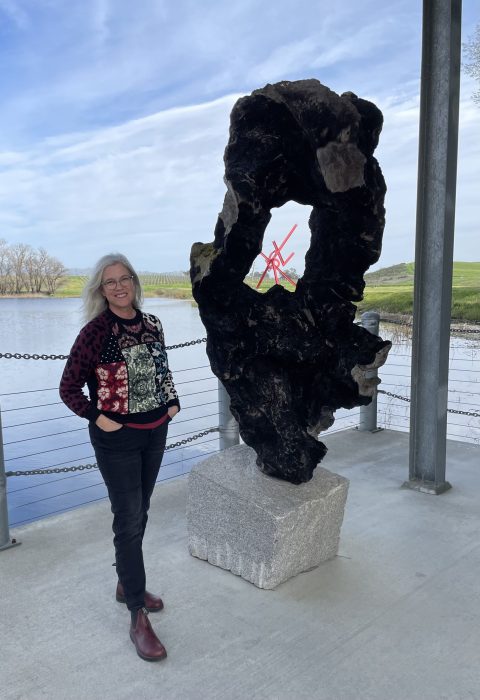
That time set the stage for a life of creative endeavors and adventures. She spent part of her childhood in Iran before the revolution sent her family home. She sang in bands with the Blue Bear School of Music. She joined adult circus camp. She started an Etsy store. She majored in international relations, lived in Mexico, and was a project manager for a number of social media and publishing companies.
She helped launch a feminist campaign against media images featuring extremely thin women, then joined San Francisco State University’s Center for Iranian Diaspora Studies as a program assistant. It was 2019, when the directorship of the school’s continuing education program for seniors came open. The Osher Lifelong Learning Institute offers a wide range of classes and discussion groups to adults 50 and older.
The dean of the college of College of Liberal and Creative Arts chose her to run it. She calls it her most successful job.
“I just enrolled a 97-year old woman because she was so jazzed when she heard Carey Perloff, the long-term artistic director of ACT, was teaching a class.” Enrollments are up. Revenues are up and more classes are being offered, she said.
Her association in the 1970s with Don and Gale van Druten was part of a program called the Open Classroom offered to creative, self-motivated students in 5th through 8th grades. There, overseen by several teachers, students of varying skill levels congregated in the same classroom. There were no rows of desks. Math and English studies were completed at the student’s pace.
A brush with revolution
Creative projects, like those at the Lancaster Castle, were a part of the school day as well. Students might write stories or make popcorn and sell it to kids in the regular classes, Bruin said. “We had such freedom – unimaginable today.”
School is behind her now, but she’s still in touch with Don and his wife, Gale, who has remained a creative mentor.
Gale Van Druten helped her design the dress for her 1998 wedding. In 2015, Bruin opened an Etsy store where she sold greeting cards she designed – simple drawings with hopeful, sweet, or funny messages – along with an interactive game Van Druten invented called the Fox Box. Players match 40 miniature items based on rhyming, like a cork with a fork, or a block with a rock. “It looks so simplistic at first, yet your eyes and mind zip from one thing to the next, often missing obvious rhymes,” Bruin said. “It’s fun at parties.”
Bruin’s childhood was filled not only with creative people but some unusual experiences.
As an electrical engineer in the military with a secret clearance, Bruin’s father had to move the family every two years.. They lived in Mississippi, where Bruin was born, as well as Ottawa, Canada, Maryland and Honolulu. She entered first grade when they settled in Walnut Creek.
But just after her freshman year in high school, and being selected to be a junior varsity cheerleader, her family was sent to Iran. Her father worked for Westinghouse. Her mother, obtained a communications job with National Iranian Radio and Television.
Luckily, Bruin found “travel to Iran was more compelling” than cheerleading. Although taking in the sights and sounds of a foreign culture, she and her friends at the Tehran American School stayed largely with each other. “We were teenagers, we thought we were invincible, going cavalierly to restaurants to eat and drink alcohol,” she said. “The opposite sex was mostly on my mind.”
Aware of their ‘otherness’
Still, they were conscious of our otherness, she said.”There were many ‘western-dressed’ Iranians under the Shah, but we dressed more modestly than we would have in the states, never wearing shorts or tank tops when we were out.”
But revolution had been brewing in Iran, and in September 1978, a curfew was imposed. Everyone had to be indoors by 9 p.m. “I have joked that for parents of teenagers it wasn’t the worst thing as there were no fights about what time we had to be home,” Bruin said. “The curfews were mandated by a larger force than parents.”
As the revolution intensified, their two-year stint in Iran was cut short. Bruin and her brother were sent home two months after curfew was imposed; her parents and two younger sisters left when Westinghouse evacuated on Dec. 8. The family then returned to their home in Walnut Creek.
While her life in Iran was very much that of a teenager, living there, as well as travel to other places, “opened my eyes to the greater world, different cultures and traditions,” she said. And guided her choice of college studies – international relations.
Bruin attended Chico State. As part of the curriculum in her last year, she lived with a family in Mexico, learning Spanish and traveling.
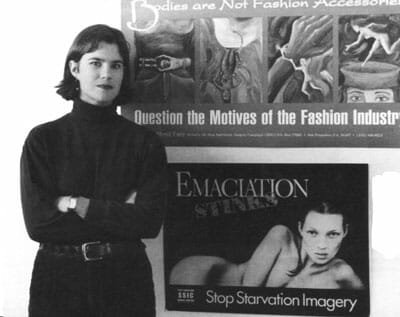
Her early jobs included work for social entrepreneurial and publishing companies, including Impact Hub, Social Capital Markets and BZ Media, until she wound up at the Center for Iranian Diaspora Studies at SFSU. She also took screenwriting, acting and ballroom dance classes – and jumped into social activism, creating About-Face, a nonprofit aimed at bolstering the images of teenage girls.
Bruin said she’s always been a feminist, but what triggered the outrage that led to About-Face was a conversation overhead while waiting in line in Central Park in New York in 1995 to get free tickets to Shakespeare in the Park and later in the theater, a Cavin Klein ad.
A family with three daughters, aged about 12, 15 and 16, were behind her in the line. The wait was hours. When the mother offered them all a cookie, one of the girls said, “I’ll take one. I can start my diet tomorrow,” Bruin recalled. “I was shocked looking at this slim young woman, this girl, regurgitating what women in our culture say about food. It was so wrong.”
A shocking message
Later that night, in the theater, next to the stage, she encountered a large billboard ad featuring model Kate Moss, emaciated and lying nude on her stomach, promoting Klein’s perfume Obsession. “It was all so upsetting knowing that this image was going to distract not only those girls and young women but everyone in the theater,” she said.
The ads were everywhere in San Francisco as well – on buses, giant billboards above Market Street.
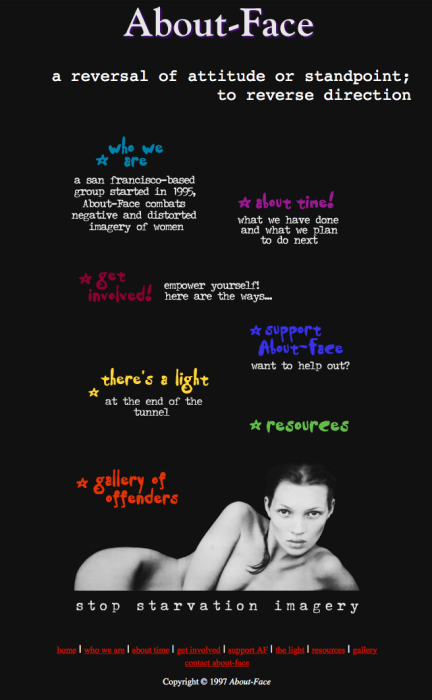
“The image reinforced a sexualization of young women and just as those sisters I stood near in line and all young women started to develop the physical characteristics of womanhood – breasts, hips, fleshier everything – there were constant images suggesting that what really mattered was staying young, thin, prepubescent,” she said. “It all made me incredibly angry.”
About-Face’s first effort was creating a poster of the ad, with the words “Emaciation Stinks! Stop Starvation Imagery” plastered across the image. Bruin’s mom, dad and friends helped put them up along the Market Street corridor.
Hooked on diversity
After six years, Bruin left the organization but stayed involved for another three years. The nonprofit still offers tools and curriculum to help girls counter diminishing and disempowering cultural messages.
She’s only taken one OLLI class herself, “Writing the 10-Minute Play” – and “that feels like an eternity ago when we were in person,” she said. But she soaked up bits of many different lessons during the past two years of the pandemic hosting classes on Zoom. “I love Richie Unterberger’s classes on rock and blues and Nick Jones’ classes on Jane Austen.”
In the past year, Bruin has been focused on finding a new space for OLLI. Once 160 Spear St. was chosen, she had to navigate instructors, students and SFSU administrators through all the changes. All while exhibiting calm. Lately, she’s been overseeing the start of spring classes.
“The first week of classes is always intense, lots of questions, people registering late, collecting fees. By the end of the six week courses, everyone has found their groove, then there’s a down week with no classes, then a week of mini-courses, and the cycle repeats.”
It’s been stressful, she admits. But she wouldn’t have it any other way. “I need a job where there are a lot of things going on, so every day is different.”


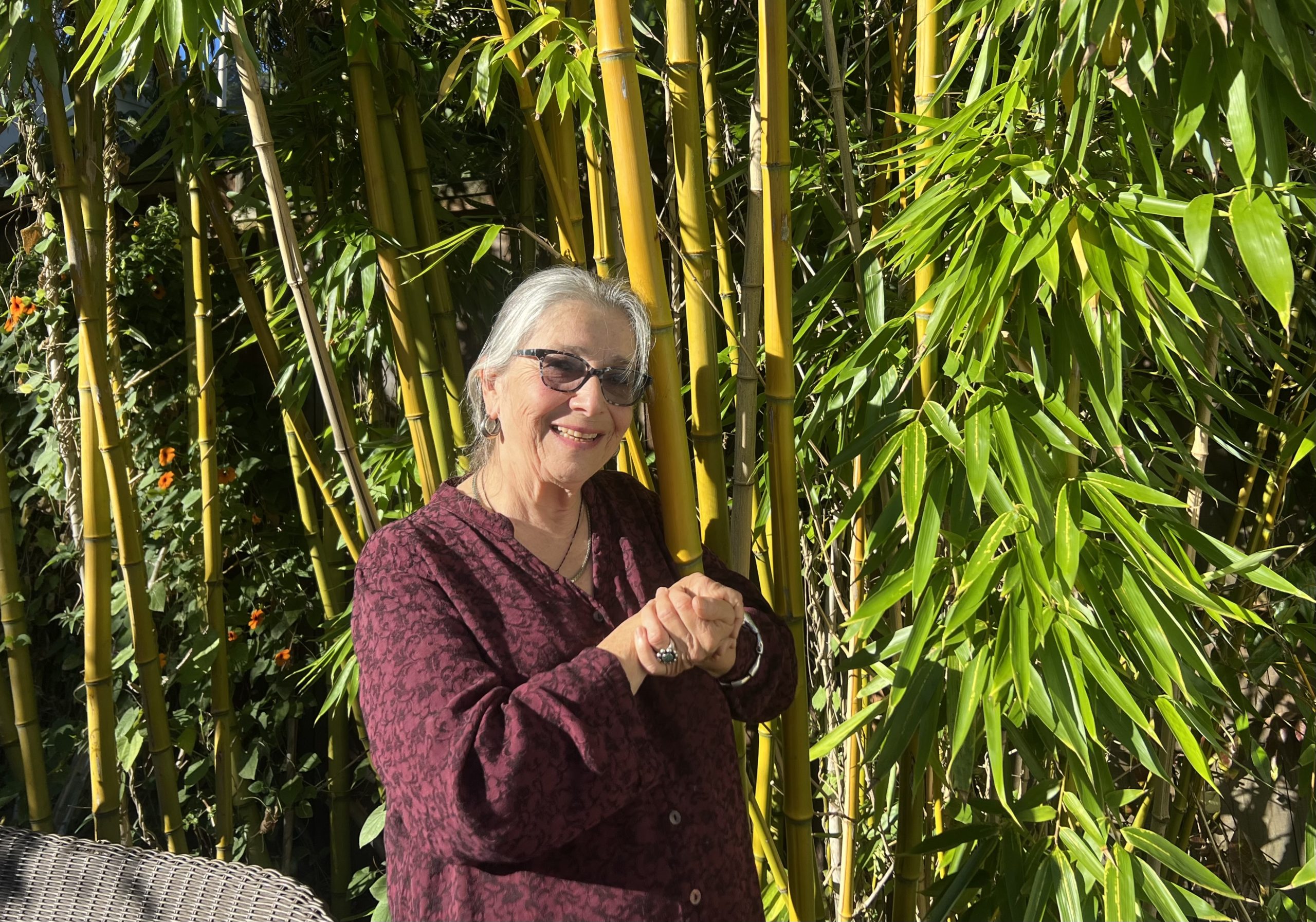

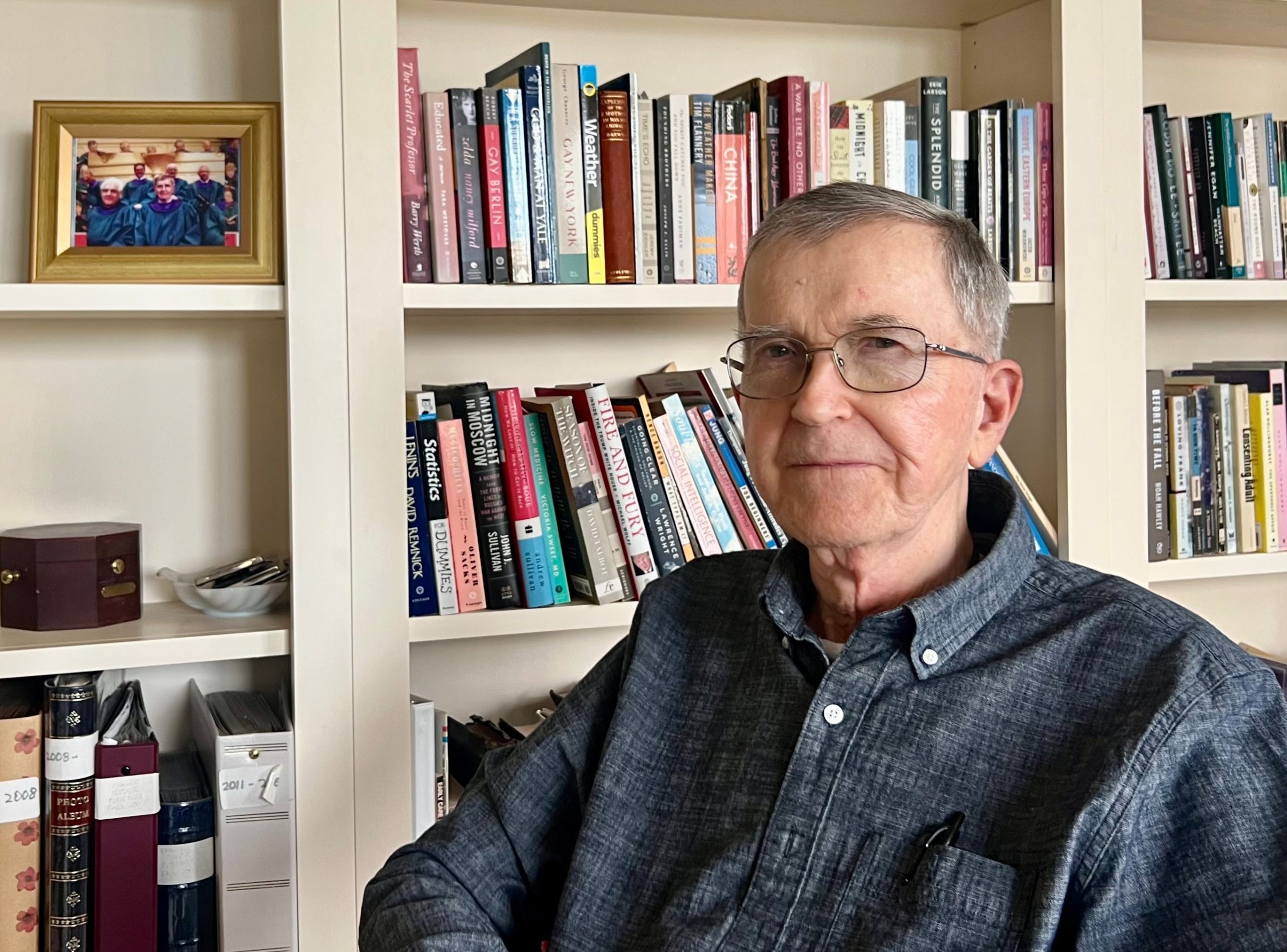

Gwen
How nice to learn more about Kathy! Thank you Jan!
judith williams sandoval
Thank you for this very encouraging story about Kathy Bruin! It is very timely!!